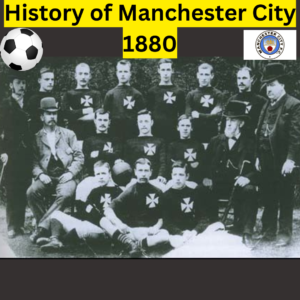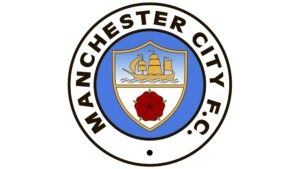Manchester City Football Club History
Manchester City Football Club, one of the most successful football clubs in the world today, traces its origins back to the working-class community of East Manchester. The club was initially formed as St. Mark’s (West Gorton) in 1880, with a strong focus on helping alleviate local social issues, such as gang violence and alcoholism, through sports.

The Early Beginnings: St. Mark’s and Ardwick AFC
The formation of St. Mark’s was initiated by Anna Connell, the daughter of the rector of St. Mark’s Church, and two church wardens. This initiative aimed to bring people together through football, fostering a sense of community. St. Mark’s played its first recorded match in 1880, wearing black jerseys with a white cross.
In 1887, the club relocated to a new ground in Hyde Road, Ardwick, and rebranded as Ardwick Association Football Club. This move marked their transition from a local parish team to a more organized football club. Ardwick AFC joined the Football Alliance in 1891, a precursor to the Football League.
The Birth of Manchester City
In 1894, financial difficulties forced Ardwick AFC to reorganize, and the club was renamed Manchester City Football Club. The new name symbolized a fresh start and aimed to represent the entire city of Manchester. With this new identity, Manchester City entered the Football League Second Division.
City achieved their first major milestone in 1899, gaining promotion to the First Division. Their first major trophy followed in 1904, when they won the FA Cup, defeating Bolton Wanderers 1-0. This victory marked City as the first Manchester club to win a significant football honor.
Challenges and Growth
Despite early successes, the club faced several challenges. In 1906, financial irregularities resulted in the suspension of key players and the departure of their star striker, Billy Meredith, to rivals Manchester United. World wars and relegations also hindered the club’s progress.
Modern Era of Success
After decades of fluctuating fortunes, Manchester City experienced a renaissance in the late 20th and early 21st centuries. In 2008, the club was acquired by the Abu Dhabi United Group, ushering in a new era of unparalleled success. City has since won multiple Premier League titles, domestic cups, and their first UEFA Champions League in 2023, establishing themselves as a global football powerhouse.
Manchester City’s journey from a small church team to one of the world’s elite clubs is a story of resilience, transformation, and ambition.

Interesting Facts About Manchester City Football Club
- The Club Was Originally Founded as St. Mark’s (West Gorton)
Manchester City was initially founded in 1880 as Mark’s (West Gorton), a team formed by local church members. It wasn’t until 1894 that the club became Manchester City FC, following a reorganization and change of name. - Manchester City Was the First Club to Win the Premier League Title in the 21st Century
Manchester City became the first club to win the Premier League in the 21st century, achieving this feat in 2002–03 under manager Kevin Keegan. - The Club’s Early History Was Marked by Financial Struggles
Despite early success, Manchester City faced several financial challenges, including in 1904, when they nearly went bankrupt. Their financial troubles led them to move from Hyde Road to Maine Road in 1923, which would become their home for 80 years. - They Were the First English Club to Have a Team of All Foreign Players
In 1999, Manchester City became the first English club to field an entirely foreign starting XI, with players from across Europe and South America. This was part of their global approach to the game. - The “Sky Blues” Nickname Originated in the 1960s
The iconic “Sky Blues” nickname for Manchester City is associated with the team’s distinctive light blue kits. The team has worn blue shirts for most of their history, with the “Sky Blues” becoming synonymous with their playing style and success. - The Club Once Played in the First-Ever League Cup Final
Manchester City was one of the founding clubs of the Football League Cup (now known as the EFL Cup) and played in the first-ever final of the competition in 1961. They defeated West Bromwich Albion to lift the trophy. - Manchester City Was a Heavy Underachiever Before the 2010s
Before their modern-day success, Manchester City was a club that often underachieved in comparison to its potential. Despite being one of the oldest clubs in England, they won only two league titles in the 20th century, with their first title coming in 1937. - Maine Road Had a Famous “Kippax” Stand
One of the most famous stands in football history was at Maine Road, known as the Kippax. This terrace was known for its passionate and boisterous supporters, creating an electric atmosphere for City games. The Kippax was demolished in 1992 when the club moved to the Etihad Stadium. - Their ‘Blue Moon’ Anthem Is Iconic
The song “Blue Moon” has become synonymous with Manchester City fans. The anthem, first introduced in the 1980s, is sung by the supporters before matches and has become an iconic part of the club’s culture. - Manchester City Was One of the First Clubs to Have a Club Shop
Manchester City was among the pioneers of football merchandising, being one of the first clubs to establish a club shop in the early 1980s, which sold merchandise like scarves, shirts, and memorabilia. - The Club’s Modern Transformation Came After 2008
The major transformation of Manchester City into a global football powerhouse began in 2008, when the club was acquired by the Abu Dhabi United Group. This takeover brought immense investment, leading to an era of success that included winning numerous Premier League titles and European trophies. - They Once Had a Period of Unbeaten Home Games in the Premier League
Between 2018 and 2021, Manchester City set a Premier League record for the longest unbeaten run at home, going 21 consecutive matches without losing at the Etihad Stadium. This was part of their dominant domestic form under Pep Guardiola. - Manchester City’s Highest Ever League Finish Was in 2018-2019
The club’s 2018-2019 season was one of their best ever. Under Pep Guardiola, City achieved a record 98 points in the Premier League, winning the title after a fierce battle with Liverpool. This was their fourth league title in just eight years. - City Has Had Several Name Changes in its Early Years
Before settling on Manchester City, the club was known as Mark’s, then Ardwick AFC, before finally becoming Manchester City in 1894. These name changes reflect the club’s evolving identity in its early years. - The Etihad Stadium Was Initially Built for the Commonwealth Games
The current home of Manchester City, the Etihad Stadium, was originally built as an athletics stadium for the 2002 Commonwealth Games in Manchester. After the Games, it was converted into a football stadium for Manchester City. - Manchester City Was the First English Club to Win the “Quadruple” in Women’s Football
In 2020, Manchester City’s women’s team made history by winning the FA Women’s Cup, FA Women’s Super League, FA Women’s Community Shield, and the UEFA Women’s Champions League – becoming the first English club to win all four trophies in a single season. - City’s Record Transfer Fee
In 2022, Manchester City set their record transfer fee by signing Jack Grealish from Aston Villa for £100 million. This made him the most expensive English player at the time. - City Has a Unique Association with the City of Manchester
Unlike many football clubs, which are based in larger metropolitan areas, Manchester City is rooted in the local community of East Manchester, which has helped the club maintain a deeply loyal fanbase, especially in its historical home areas. - The Club’s Original Colors Were Red and White
Manchester City’s first kit, worn as Mark’s, was a combination of red and white, reflecting the early church’s colors. It was only later that the club adopted its famous sky blue colors, which have since become iconic.
These lesser-known facts highlight the rich, diverse, and often surprising history of Manchester City, which has grown from a local club into one of the most powerful forces in world football today.
